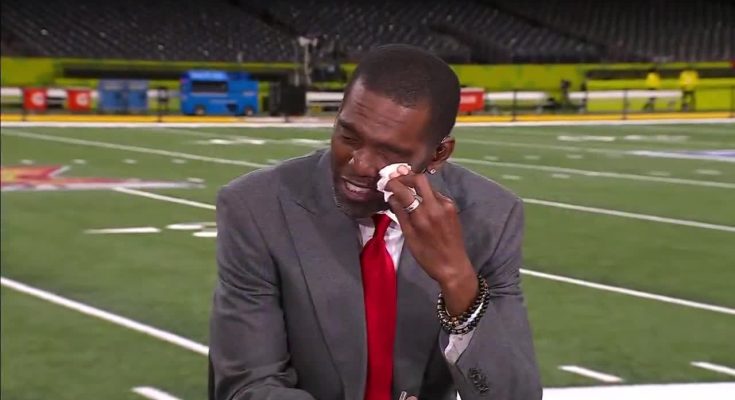There are players who dazzle with consistency, those who grind through every yard, every season, with a kind of relentless reliability. Then, there are players like Randy Moss—lightning in a bottle, a wide receiver who changed the shape of defenses and electrified the game in a way that few others ever could. His story is as complicated as it is compelling, a tale of raw talent, self-belief, controversy, and redemption. In 2007, the narrative of Randy Moss shifted dramatically—from being viewed as a fading star to becoming the catalyst of one of the greatest offenses in NFL history. That season, Moss didn’t just come back—he exploded back into relevance, into the record books, and into the hearts of fans who once wondered whether the magic had permanently left him. In every sense of the word, Randy Moss was the embodiment of a comeback.
It’s important to understand what Moss was coming back from. By the time the 2006 season ended, Moss was seen by many as a cautionary tale. After a legendary run in Minnesota that included dazzling catches, deep bombs, and unforgettable moments, Moss found himself in Oakland, where his career seemed to stall. There was a sense that he had lost interest in the game, and worse, the game had lost interest in him. His statistics dropped precipitously. His body language became a talking point. Analysts and fans alike questioned his effort. In two seasons with the Raiders, Moss caught just 102 passes for 1,558 yards and 11 touchdowns combined—a far cry from his Viking years. His connection with quarterbacks was non-existent. His trademark big plays had vanished. Whispers about him being washed up became louder. People wondered if Moss had burned out at 30.
Then came the trade. A quiet, under-the-radar deal that brought him to New England for a mere fourth-round pick. The price tag spoke volumes—no one thought Moss was still Moss. The Patriots, as they often do, took a calculated risk. And what happened next was nothing short of historic.
The 2007 season was a perfect storm of talent, motivation, and opportunity. Moss walked into a system built for precision, guided by the cool mind of Bill Belichick and the rocket arm of Tom Brady. The chemistry was immediate. From the very first preseason game, it was clear: Randy Moss still had it. Not only was he faster than defenders, he was smarter. His routes were crisper, his hands surer, and his desire—to prove something, to remind the world of who he was—more evident than ever. He was back, and he was on a mission.
What followed was a season of statistical obliteration. Moss set the single-season touchdown reception record with 23 scores, surpassing Jerry Rice’s mark of 22. He led the league in receiving touchdowns, racked up over 1,400 yards, and became the most dangerous weapon in an offense that looked more like a Madden cheat code than a real-life NFL team. The Patriots went undefeated in the regular season. Brady threw 50 touchdown passes. But make no mistake—Moss was the engine that made it possible. His ability to stretch the field vertically forced defenses to choose between stacking against the run or bracketing him with two or three defenders, which opened the field for everyone else. The gravity of Randy Moss—his mere presence—was unlike anything in the league.
More than the numbers, though, was the way Moss played. The swagger returned. The sideline one-handers, the acrobatic toe-drags, the ability to high-point a ball over helpless defenders—it all came back. It felt like watching a resurrection. This wasn’t just a player padding stats or riding a system. This was vintage Randy Moss doing what only Randy Moss could do. And the fans noticed. The league noticed. He was on every highlight reel, dominating every defensive coordinator’s nightmares, and reminding everyone that talent—once in a generation talent—doesn’t just disappear.
There’s something special about watching an athlete reclaim their greatness. It’s more than just performance—it’s about defying the narrative, rising above doubt, silencing critics not with words but with action. Moss didn’t give many press conferences. He didn’t need to. Every Sunday, his actions spoke for him. Touchdown after touchdown, route after route, he told the football world, “I’m still here. And I never really left.” That’s what makes his comeback so powerful. It wasn’t a surprise playoff win or a sentimental final season. It was dominance. Ruthless, glorious, dominant football.
Of course, Moss’s journey has always been layered. From the beginning, he was a polarizing figure. Outspoken, brash, supremely confident—he never played the PR game the way others did. He was unapologetically himself, which sometimes cost him goodwill. But in 2007, the focus shifted. The questions about his attitude and commitment faded. In New England, surrounded by structure and a team culture that emphasized preparation and discipline, Moss thrived. He bought in. And Belichick, often viewed as a cold tactician, clearly had a deep respect for Moss’s mind as much as his physical gifts. That mutual respect created a harmony that transformed the Patriots’ offense and Moss’s career.
When thinking about comebacks, we often focus on hardship or injury. But mental wear, doubt, and public perception can be just as challenging. For Moss, the climb back wasn’t just about proving to others he could still play—it was about proving it to himself. That kind of inner battle, the tug-of-war between past glory and current form, has broken many athletes. Moss leaned into it. He didn’t run from his reputation—he redefined it. That takes resilience. That takes pride. That takes greatness.
The legacy of that 2007 season will always be a little bittersweet. The Patriots’ dream of a perfect season fell just short in the Super Bowl against the Giants. Moss scored in that game, naturally, but it wasn’t enough. Still, his season wasn’t tarnished. If anything, it added another layer of depth to his story. Even in defeat, Moss’s brilliance was undeniable. The records remained. The transformation was complete. He went from discarded to indispensable in less than a year. And in doing so, he not only revived his own career but also helped elevate Brady and the Patriots to a new stratosphere.
After 2007, Moss continued to be productive. He would play a few more seasons, have ups and downs, and eventually retire with over 15,000 receiving yards and 156 touchdowns—ranking among the top in NFL history. But 2007 remains the crown jewel, the year he reminded everyone why he was feared, respected, and unforgettable. It was the ultimate answer to those who doubted him. For one magical season, Randy Moss didn’t just come back—he took over.
Comebacks in sports are often painted with sentimentality, the warm glow of perseverance. But Moss’s comeback wasn’t just heartwarming—it was awe-inspiring. It was dominant. It was a reclamation of identity. It was Randy Moss reminding us all that talent like his doesn’t fade, it waits for the right moment to reignite. And when it did, the league had no choice but to watch and remember.
There are few players who can walk away from the game and still cast a shadow over it. Randy Moss is one of them. But in 2007, he wasn’t a shadow—he was the sun. Everything revolved around him. Defenses contorted themselves trying to stop him. Analysts ran out of superlatives. Fans were given a gift they didn’t expect: one last look at what made Randy Moss a legend.
So, for all the stories of redemption, for all the tales of players coming back from injury, scandal, or obscurity, Randy Moss’s 2007 season stands apart. It wasn’t just a comeback. It was a renaissance. A performance so overwhelming that it erased doubt and redefined what it meant to be great. In a league that moves on quickly, where today’s star is tomorrow’s afterthought, Moss reminded everyone that greatness can’t be ignored, even if it’s been buried under a few years of bad luck and worse fits.
That’s why he’s our Comeback Player of the Year. Not because he returned. But because when he did, he returned with fire, fury, and unmatched brilliance. Welcome back, Randy Moss. Football missed you—and in 2007, you gave us a season we’ll never forget.



